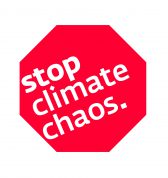Shop intelligently! Some foodstuffs will never be grown locally, and some shouldn’t be. For example, it’s more environmentally-friendly to import tomatoes from Spain than to grow them here in heated greenhouses. But it’s not necessary to import apples during the apple season!
 Celebrate Creation Time (1st September to 4th October) by giving thanks for all God’s abundant blessings, especially the gifts of food and water! Plan at least one eco-action to do in the coming weeks to help the world become a more sustainable place.
Celebrate Creation Time (1st September to 4th October) by giving thanks for all God’s abundant blessings, especially the gifts of food and water! Plan at least one eco-action to do in the coming weeks to help the world become a more sustainable place.Make a plan! Decide how your church/community could celebrate Creation Time and/or Moving Planet Day! Get together with some like-minded individuals and decide what you are going to do in your locality and how you are going to promote it. How about a litter pick? A carbon-free walk/cycle? Or plant some spring bulbs?
 Don’t let go! There are plenty of ways to celebrate special occasions without resorting to the popular activities of releasing helium balloons and Chinese lanterns. These are lethal for farm animals, wildlife and the environment at large, with parts of helium balloons having been found in the stomachs of turtles, dolphins and whales. Chinese lanterns can pose a risk to farm animals, wildlife and to property: the wire in the lanterns can be fatal if accidentally eaten by animals and they are a clear fire risk. And beware! Biodegradable balloons and lanterns are not the eco-friendly alternatives they appear – they take time to degrade and, before they do, they are a lethal hazard. Balloons can stay intact in an animal’s gut long after ingestion, and long enough to cause death by starvation.
Don’t let go! There are plenty of ways to celebrate special occasions without resorting to the popular activities of releasing helium balloons and Chinese lanterns. These are lethal for farm animals, wildlife and the environment at large, with parts of helium balloons having been found in the stomachs of turtles, dolphins and whales. Chinese lanterns can pose a risk to farm animals, wildlife and to property: the wire in the lanterns can be fatal if accidentally eaten by animals and they are a clear fire risk. And beware! Biodegradable balloons and lanterns are not the eco-friendly alternatives they appear – they take time to degrade and, before they do, they are a lethal hazard. Balloons can stay intact in an animal’s gut long after ingestion, and long enough to cause death by starvation.Switch to an eco-friendly search engine – www.envirosearch.org – that donates profits to charity! Launched by Carbonfund.org, which supports third-party renewable energy and reforestation projects around the world, the free online search engine is powered by Bing and hosts sponsored advertisements through Yahoo. The revenue generated by these advertisements is then donated by Carbonfund.org to environmental projects around the world, including the Haiti Reforestation Initiative, and the India Mangrove Project.
 Don’t waste food! A third of the perishable food we buy ends up in the bin, which is shameful 🙁 Wasted food is not only a waste of money and resources, but is also a major contributor to climate change. See the Environmental Protection Agency’s website – www.stopfoodwaste.ie – for tips and advice on shopping sensibly, recipes and uses for leftovers, composting and local info re amenity centres etc. Also check out the Love Food Hate Waste Facebook page.
Don’t waste food! A third of the perishable food we buy ends up in the bin, which is shameful 🙁 Wasted food is not only a waste of money and resources, but is also a major contributor to climate change. See the Environmental Protection Agency’s website – www.stopfoodwaste.ie – for tips and advice on shopping sensibly, recipes and uses for leftovers, composting and local info re amenity centres etc. Also check out the Love Food Hate Waste Facebook page.
Make a New Year’s eco resolution! There’s so many to choose from – Buy more local and organic food! Drive less – walk, cycle and use public transport more! Campaign more! Avoid buying things with lots of packaging! Use recycled computer paper! Fly less often! Switch to Airtricity! Insulate your house! Get a compost bin! Switch off TV & computer when not in use! Grow your own food! Join the local Grow It Yourself group! Get involved in a community garden!
 Celebrate an eco-friendly Christmas! Support the economy and the environment by buying locally-produced Irish products this Christmas! Buy Christmas cards from charities that use recycled paper. Deck the halls with real holly rather than spending money on artificial decorations that won’t biodegrade. Give charity or environmentally-friendly gifts or tokens for theatre, sporting events etc. After the festivities are over, don’t forget to recycle your tree, cards and wrapping paper and donate unwanted gifts to a worthy cause! For more ideas, see this leaflet produced by Dundrum Methodist Church’s eco team – Ideas for an eco friendly Christmas – Feel free to print this (on recycled paper, of course!) and circulate to your family/parish/community.
Celebrate an eco-friendly Christmas! Support the economy and the environment by buying locally-produced Irish products this Christmas! Buy Christmas cards from charities that use recycled paper. Deck the halls with real holly rather than spending money on artificial decorations that won’t biodegrade. Give charity or environmentally-friendly gifts or tokens for theatre, sporting events etc. After the festivities are over, don’t forget to recycle your tree, cards and wrapping paper and donate unwanted gifts to a worthy cause! For more ideas, see this leaflet produced by Dundrum Methodist Church’s eco team – Ideas for an eco friendly Christmas – Feel free to print this (on recycled paper, of course!) and circulate to your family/parish/community.Eat less meat! It takes far more land & water & 10 times the amount of energy to produce animal than vegetable protein, so why not cut down on the amount of meat you eat? Meat-free Mondays, anyone? According to UN specialists, one meat-free day per week would help to tackle climate change more than reducing car journeys. The UN Food and Agriculture Organisation says that livestock production is one of the major causes of the world’s most pressing environmental problems, including global warming, land degradation, air and water pollution, and loss of biodiversity.
 Enjoy Creation! Take time to see heaven in nature! Get out and about in the countryside, the local park or even your garden and open your eyes to the beauty all around. Take time to wonder at the colours and intricate patterns and breathe in nature’s many different fragrances 🙂
Enjoy Creation! Take time to see heaven in nature! Get out and about in the countryside, the local park or even your garden and open your eyes to the beauty all around. Take time to wonder at the colours and intricate patterns and breathe in nature’s many different fragrances 🙂Fly less! An abundance of cheap flights doesn’t mean that we must spend every holiday abroad. Choose to holiday at home sometimes and explore some of our own beautiful country (without forgetting to pack your raincoat and wellies)! When you do fly, offset your air travel by investing in renewable energy projects. When it comes to reducing the emissions associated with air travel, we really only have two choices: buy carbon offsets, or don’t fly at all. Look at it as a donation to a good cause rather than a way to excuse bad behaviour!
 Grow your own! Enjoy fresh food and reduce air miles to air metres by growing your own salads, herbs and vegetables. Lettuce, rocket, chives and many other quick growing salad ingredients can be planted outside any time from April to the end of August. Basil and corriander can be planted in small pots and kept on the kitchen windowsill, though you need to water them every day. Many vegetables can be grown without greenhouses or any special treatment – just plant them in the ground in a sunny spot and water them every alternate evening. You can grow courgettes, tomatoes, beans (round and runner), peas (podded and mange toute) and lots of others this way. It’s remarkably easy and very satisfying to eat your own produce and it’s excellent for the environment! See giy.ie.
Grow your own! Enjoy fresh food and reduce air miles to air metres by growing your own salads, herbs and vegetables. Lettuce, rocket, chives and many other quick growing salad ingredients can be planted outside any time from April to the end of August. Basil and corriander can be planted in small pots and kept on the kitchen windowsill, though you need to water them every day. Many vegetables can be grown without greenhouses or any special treatment – just plant them in the ground in a sunny spot and water them every alternate evening. You can grow courgettes, tomatoes, beans (round and runner), peas (podded and mange toute) and lots of others this way. It’s remarkably easy and very satisfying to eat your own produce and it’s excellent for the environment! See giy.ie.
Go on a carbon fast for Lent! Choose a few ways to cut your carbon during Lent (and beyond) by turning your TV, computer and other electrical equipment off when not in use (even leaving appliances on standby uses electricity). Take a shower instead of a bath. Cycle or walk short distances that you would normally drive. It’s difficult to see how our energy-hungry lifestyles cause suffering for people around the world we never meet, but God asks us to act justly, to love mercy and to walk humbly. We must fast from carbon, pray and cry out for climate justice. To see details of Tearfund’s Carbon Fast, go to http://www.tearfund.org/Campaigning/Carbon+Fast.
 Sign up to the 10:10 campaign! 10:10 is an ambitious project to unite every sector of society behind one simple idea – that by working together a 10% cut in carbon emissions can be achieved. Sign up at either www.1010.ie (if you live in the Republic) or www.1010uk.org (if you live in Northern Ireland).
Sign up to the 10:10 campaign! 10:10 is an ambitious project to unite every sector of society behind one simple idea – that by working together a 10% cut in carbon emissions can be achieved. Sign up at either www.1010.ie (if you live in the Republic) or www.1010uk.org (if you live in Northern Ireland).Invest the eco way! Not only can we spend our money in responsible ways, but we can also invest it to support social justice and prevent environmental degradation. Climate change, human rights and poverty alleviation are all issues that are being addressed by green and ethical investments today. Green and ethical investments can promote transparency and encourage corporate social responsibility, help fund solutions to global problems and may contribute to more sustainable profits in the longer term. They also help people reflect their values in their investments. National Ethical Investment Week each November aims to help investors consider green and ethical investment options. See www.neiw.org
 Pick up a piece of litter every day! What if 100,000 people picked up a piece of litter each day? How might the world change? If you did, how might you feel about yourself? And your environment? The Litter Project, a movement that started in the US, encourages people to pick up a piece of litter each day and to tell others about it. Hopefully they will do the same! It is a simple, tangible way to make a daily difference to the world. If you tell people about your daily habit, you will surely inspire at least a few more supporters. See www.litterproject.com and http://www.facebook.com/group.php?gid=128592503843275.
Pick up a piece of litter every day! What if 100,000 people picked up a piece of litter each day? How might the world change? If you did, how might you feel about yourself? And your environment? The Litter Project, a movement that started in the US, encourages people to pick up a piece of litter each day and to tell others about it. Hopefully they will do the same! It is a simple, tangible way to make a daily difference to the world. If you tell people about your daily habit, you will surely inspire at least a few more supporters. See www.litterproject.com and http://www.facebook.com/group.php?gid=128592503843275.Be energy efficient! Don’t leave televisions or computers on standby – switch them off when not in use. Use energy-efficient light bulbs – when a light bulb runs out, replace it with an energy-efficient one. Energy-efficient light bulbs last 12 times as long as traditional bulbs.
 Use paper wisely! It is estimated that each year each one of us throws away two trees’ worth of paper and card. In theory, paper comes from an infinitely renewable source because trees can be replaced. However, timber forests are not always managed with the environment in mind. Trees that are not native to an area are often planted because they grow quickly and can therefore be sold quickly. Native wildlife then loses its natural habitat.
Use paper wisely! It is estimated that each year each one of us throws away two trees’ worth of paper and card. In theory, paper comes from an infinitely renewable source because trees can be replaced. However, timber forests are not always managed with the environment in mind. Trees that are not native to an area are often planted because they grow quickly and can therefore be sold quickly. Native wildlife then loses its natural habitat.
Reduce the amount of paper you use by correcting documents on your computer and avoid unnecessary printing. Reuse both sides of the paper and print draft documents on scrap. Recycle all of your waste paper.
 Buy Fairtrade! One of the Fairtrade criteria is that the environment is considered during production. Rainforest clearance is not practised and many pesticides are banned. Fairtrade items do not have to be organic, although many are. Major retailers are no longer just stocking tea and coffee, but also Fairtrade chocolate, rice, fruit, juices, wine and clothing.
Buy Fairtrade! One of the Fairtrade criteria is that the environment is considered during production. Rainforest clearance is not practised and many pesticides are banned. Fairtrade items do not have to be organic, although many are. Major retailers are no longer just stocking tea and coffee, but also Fairtrade chocolate, rice, fruit, juices, wine and clothing.
If there were no Fairtrade sales, many small coffee farmers would have to cut down their trees and give up. The current price of coffee in the conventional market does not cover their costs.
‘Green’ your garden! Creating a ‘green’ garden will encourage wildlife and give you lots of opportunities to conserve resources and recycle waste. Water the garden only when absolutely necessary. Get a water butt in which to collect rainwater for use in the garden. You could also get a system to filter and reuse ‘grey’ water from the kitchen and bathroom. Water plants and shrubs in the cool of the morning or early evening, to minimise loss from evaporation. Did you know a garden sprinkler can use 1,000 litres of water in one hour?
 Organise a walk/cycle to church Sunday! Choose a particular Sunday to encourage all parishioners who are fit and able to walk/cycle. Anyone who lives too far away can be invited to drive the first part of the route, then park their car and walk the rest. It will show people how easy it is and, you never know, it might start a habit of saying, “Will we walk or will we drive?” instead of automatically stepping into the car.
Organise a walk/cycle to church Sunday! Choose a particular Sunday to encourage all parishioners who are fit and able to walk/cycle. Anyone who lives too far away can be invited to drive the first part of the route, then park their car and walk the rest. It will show people how easy it is and, you never know, it might start a habit of saying, “Will we walk or will we drive?” instead of automatically stepping into the car.
Buy an ecobutton! The ecobutton is a small device that can help you save electricity each time your computer is left idle. It is illuminated and sits on your desk next to the keyboard, thus serving as a visual reminder and prompt to save energy. It connects to the computer via a USB cable. Each time you take a break, make a phone call etc, simply press the ecobutton and your computer is put into the most efficient energy saving mode available – ‘ecomode’ – which ensures that both your computer and monitor draw only the same nominal power as when they are shut down. Your computer will instantly return to where you left off when you press any key on the keyboard. An ecobutton can be purchased from Amazon or www.eco-button.com.
 Mobile phones – Resist the lure to update your mobile phone more than necessary. And, when you do, be sure to recycle your old one (many charities can make money from your cast-offs and re-usable phones can often be used in developing countries). The average mobile phone contains around 30 elements, including copper, lithium and lead, which can be toxic in landfill. Also, remember to unplug your phone charger when not in use to avoid emitting up to 7kg of CO2 each year while cutting down your electricity bill.
Mobile phones – Resist the lure to update your mobile phone more than necessary. And, when you do, be sure to recycle your old one (many charities can make money from your cast-offs and re-usable phones can often be used in developing countries). The average mobile phone contains around 30 elements, including copper, lithium and lead, which can be toxic in landfill. Also, remember to unplug your phone charger when not in use to avoid emitting up to 7kg of CO2 each year while cutting down your electricity bill. Get lobbying! Write to your local TD and join in Stop Climate Chaos actions. See www.stopclimatechaos.ie.
Get lobbying! Write to your local TD and join in Stop Climate Chaos actions. See www.stopclimatechaos.ie.
Avoid packaging! Buy minimally-packaged products. Bring your own cloth shopping bag and refuse unnecessary bags over the counter.
Turn off lights when you leave a room
Dry clothes outdoors (weather permitting)!
Plant a tree! Or two! Or three!
Buy organic and Fairtrade food and clothes, where possible.
Support charity and eco shops
